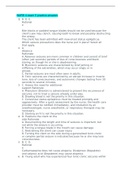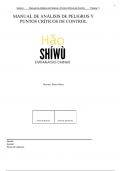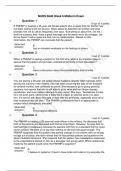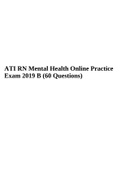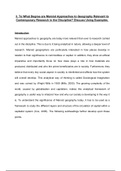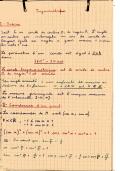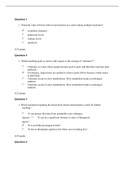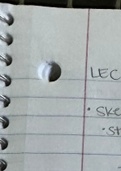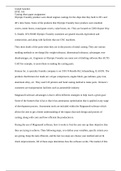Summary of First Year, First Semester Microeconomics
(ECO1010F) lessons (2021)
Macroeconomics I (University of Cape Town)
Studocu is not sponsored or endorsed by any college or university
Downloaded by Ntando Mabaso ()
, lOMoARcPSD|22199454
•
Downloaded by Ntando Mabaso ()
, lOMoARcPSD|22199454
1st Semester Microeconomics ECO1010F – Theory Notebook University of Cape Town
Table of Contents
19TH MARCH – UNIT 1, LESSON 1 ................................................................................................................................................ 3
21ST MARCH – UNIT 1, LESSON 2 ................................................................................................................................................. 7
23RD MARCH – UNIT 1, LESSON 3 – PART A ................................................................................................................................. 8
24TH MARCH – UNIT 1, LESSON 3 – PART B ............................................................................................................................... 11
26TH MARCH – UNIT 3, LESSON 1 – PRODUCTION FUNCTION .................................................................................................... 13
31ST MARCH – UNIT 3, LESSON 2 – FEASIBILITY, DECISION-MAKING ......................................................................................... 14
01ST APRIL – UNIT 3, LESSON 3 – BUDGET CONSTRAINTS – PART A ........................................................................................... 17
03RD APRIL – UNIT 3, LESSON 3 – BUDGET CONSTRAINTS – PART B .......................................................................................... 21
06TH APRIL – UNIT 3, LESSON 4 – TECHNOLOGY – PART A ......................................................................................................... 23
07TH APRIL – UNIT 3, LESSON 4 – PART B................................................................................................................................... 23
12TH APRIL – UNIT 3, LESSON 5 ................................................................................................................................................. 24
13TH APRIL – UNIT 4, LESSON 1 – SOCIAL INTERACTIONS .......................................................................................................... 26
14TH APRIL – UNIT 4, LESSON 2 – GAME THEORY ...................................................................................................................... 27
15TH APRIL – UNIT 4, LESSON 3 – PREFERENCES ........................................................................................................................ 30
16TH APRIL – UNIT 4, LESSON 4 – PUBLIC GOODS AND EXPERIMENTS ....................................................................................... 33
19TH APRIL – UNIT 4, LESSONS 5&6 – SEQUENTIAL MOVE GAME .............................................................................................. 35
12TH MAY – UNIT 6, LESSON 1 – INTRODUCTION TO FIRM STRUCTURES ................................................................................... 38
13TH MAY – UNIT 6, LESSON 2 – INCOMPLETE CONTRACTS ....................................................................................................... 42
14TH MAY – UNIT 6, LESSONS 3&4 – EMPLOYMENT RENT ......................................................................................................... 45
16TH MAY – UNIT 6, LESSON 5 – THE LABOUR-DISCIPLINE MODEL ............................................................................................ 49
17TH MAY – UNIT 6, LESSON 6 – USING LABOUR-DISCIPLINE MODEL ........................................................................................ 53
25TH MAY – UNIT 7, LESSON 1 – INTRODUCTION TO COSTS ...................................................................................................... 54
26TH MAY – UNIT 7, LESSON 2 – COST CURVES .......................................................................................................................... 58
31ST MAY – UNIT 7, LESSON 3 – ISOPROFIT APPROACH ............................................................................................................ 62
01ST JUNE – UNIT 7, LESSON 4 – PROFIT MAXIMISATION .......................................................................................................... 65
02ND JUNE – UNIT 7, LESSON 5 – GAINS FROM TRADE .............................................................................................................. 67
07TH JUNE – UNIT 8, LESSON 1 – SUPPLY AND DEMAND: PRICES ............................................................................................... 72
09TH JUNE – UNIT 8, LESSON 2 – SHIFTS IN DEMAND AND SUPPLY............................................................................................ 75
15TH JUNE – UNIT 8, LESSON 3 – TAX INCIDENCE AND ELASTICITY ............................................................................................ 78
16TH JUNE – UNIT 8, LESSON 4 – PRICE TAKING & PERFECT COMP. ........................................................................................... 83
ELIA BORDIN 2
Downloaded by Ntando Mabaso ()
, lOMoARcPSD|22199454
1st Semester Microeconomics ECO1010F – Theory Notebook University of Cape Town
19 March – Unit 1, Lesson 1
th
Part A
Definitions of Economics:
o Traditional: social science that looks at how societies make efficient use of
scarce/limited resources to maximise satisfaction of people’s unlimited material
wants;
o Main Alternative: theories, principles and models that deal with how the market
process works, in an attempt to explain how wealth is created and distributed, how
people allocate scarce resources and have many alternative uses, and other such
matters that arise in dealing with wants and their satisfaction;
o Other alternatives:
Social science that studies production, distribution and consumption of goods
and services which focuses on the behaviour and interactions of economic
agents, and how economies work;
Branch of knowledge concerned with production, consumption and transfer of
wealth;
Study of how individuals, governments, businesses and other organisations
make choices that affect allocation/distribution of scarce resources;
Study of how people interact with each other and with their natural
surroundings in producing their livelihoods, and how this changes over time.
Economics does not focus on economic variables the news media focuses on, like share
prices/Stock Exchange, interest rates, interest rates and inflation;
ECONOMIC PROBLEM: Problem of scarcity and choice, needs versus wants;
Three basic economic questions:
o Output question: What to produce?
o Input question: How to produce?
o Distribution question: For whom to produce? That is, who will benefit? Short answer
for monetary economies: those with money.
It is possible to produce the same things with different combinations of labour and capital:
o Many people, little equipment, OR
o Little people, plenty of sophisticated equipment.
The above is a choice depending on country and/or specific situation/location/circumstance,
mostly based around the following principles:
o Price of input (either labour or capital);
o Relative abundance of the input (either labour or capital).
ELIA BORDIN 3
Downloaded by Ntando Mabaso ()

